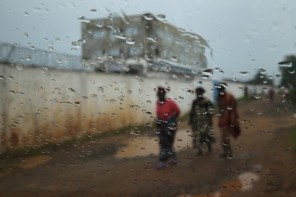I’ve been working quite a lot lately, and I tend to balance that by avoiding this whole Internet 2.0 thing and going analog — does Kindle count as analog? — and curling up with a book (“book”). Or lots of magazine articles. I’ve been reading a lot, and I’ve got a few gems that you might want to read, too:
— Annia Ciezadlo’s Day of Honey: A memoir of food, love and war is finally out. I was so excited about the tiny excerpt I found almost a year ago that I blogged about. I’m only a chapter in — I’d tell you page numbers, but in my world, that’s Kindle screens, which is an incredibly manipulable variable — but it’s beautiful, companionful, comforting. Her description of grape leaves — they are a “narrative” food, one that requires time and chatting and gossip, a food of layers, like the “buttery tulle” of Baklava –makes me want to give up writing. I’ll never get it that good.
— Rebecca Hamilton’s Fighting for Darfur is out, too. Bec did the hard work of chugging through reports, FOIA forms, and all kinds of other mind-numbing researchyness to find out what effect the Darfur advocacy movement, which she basically helped launch by co-founding the Harvard divestment initiative, actually has had on policy, and on the ground in Sudan. It’s a must-read. (She’s also doing a lot of speaking events, so check out her calendar. And listen to her on BBC’s The World.)
— I finally read Zeitoun. Probably all three of you who read this blog read it years ago, but — holy hell. There’s a liberal argument against Guantanamo, that eventually those soldiers will come home in body but not in training, but New Orleans after Katrina proves that it’s not just an argument. It’s damned true, at least according to Dave Egger’s retelling of one family’s experience.
— By the by, if you want more proof of how soldiers allowed to torture and/or practice other nasty offenses against prisoners/”the enemy” hit home after war, you should read Darius Rejali’s Torture and Democracy. (That’s right — “and.” We should all be uncomfortable with the transitiveness of that conjunction.)
— I reread former NYT Africa correspondent Howard French’s memoir, A Continent for the Taking. If you’re an Africa-phile, you’ve got to read it. I’ve got some issues with it (hence the reread), but you’ve still got to read it.
— Things called Dispatches — a one-hour international radio program from the Canadian Broadcasting Corporation, and a fabulous little magazine called dispatches devoted to stories in context, the brain child of journalists who realized that particular value is often missing from the industry.
— John Patrick Leary’s “Detroitism,” a fascinating, thoughtful essay by a Detroiter about the photographic “ruin porn” inflicted on depictions of his city. So much of what he says has relevance to discussions about representations of the “third world” — a subject, in fact, which he is writing a book on, or so his Guernica Magazine byline says.
— This fantastically honest article about how most memoir writing sucks. It’s entertaining, even if you feel a bit bad for the schadenfreude of it all. To tease you, it begins, “A moment of silence, please, for the lost art of shutting up.”
At which point, I think I shouldn’t keep talking.



“Torture and Democracy” is quite a book. Rejali discusses how democratic (or at least non-authoritarian, more or less open societies) have developed what he calls clean methods of torture–those that don’t leave visible scars or physically incapacitate the victim. It is exhaustive, almost a reference on uses of clean torture with chapters on how it has evolved over the years and across continents.
The only sense of hope is how local, national and international monitoring by the press, the judiciary and non-government organizations can slow the spread of torture. Put simply, officials in democratic countries can’t afford to be exposed and caught.
It wasn’t confined to Guantanamo or Long Kesh. One of the he brings up happened in one police district headquarters in Chicago where suspects were routinely forced to confess to crimes they didn’t commit using so-called “magneto” torture which is electricity applied to sensitive parts of the body.
Very happy to see your recommendation–I have been talking this book up it can be a pretty tough sell.
Chicago is precisely what I was thinking of. Although “clean” torture is in no ways limited to democracies, as I found out when I researched my big torture piece. There’s an odd, unacknowledged underground quasi-conversation in which people who want to cause bodily harm figure out how to do it without leaving marks…